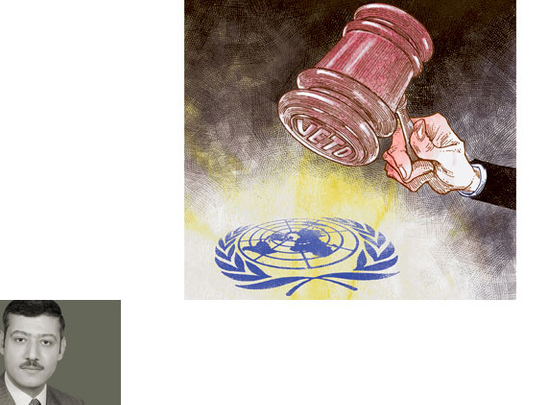
The 67 annual session of the United Nations General Assembly has commenced in the shadow of numerous global crises. Most of the opening sessions’ speeches and remarks focused on issues such as the Syrian crisis, Iran’s nuclear ambitions, the Arab-Israeli conflict, a looming humanitarian crisis in much of the developing world and the undertow of worldwide recession.
A few in fact have noticed that the very existence of the UN in its current structure has become a problem in itself. It is becoming increasingly a talking shop wherein any world problem has rarely been solved. The clash of interests between the more powerful members of the organisation has rendered it as a mere meeting venue wherein delegates of 193-member states pretend that they are working to preserve world peace and security, a prerequisite for the stability needed for global economic growth, sustainable development and social progress.
The real problem of the UN lies with the Security Council, which represents the interests of the more powerful members, rather than those of the international community. Thanks to the power of the veto, the UN has consistently been unable to resist being manipulated by the great powers to their own advantage.
It is clear that this problem is entrenched in the body’s original founding structure. Despite initial hopes for a truly world government, the UN remains a western club. The Security Council, in particular, has made the global body even more euro-centric and less representative of the international system as a whole.
It must be said, however, that the UN was a creation of its time. For the entire period of the Cold War, it held onto its original structure whereby the Security Council was the executive body and other states had relatively little influence. Hence, the real power in the UN was largely invested in the victors of the Second World War — the US, UK, Russia, France and China. The Cold War served to fossilise this power structure. Calls to end the dominance of the few have grown ever louder since the end of the Cold War and the radical transformation of the international system which followed in its wake.
Proposals
A number of proposals to reform the UN have been made. One proposal is to increase the number of permanent members in the Security Council — to keep the structure basically as it is, but bring more important states into positions of power. The prime beneficiaries of such a move would be Germany and Japan.
Both countries are represented at the economic level in the G8 and, as such, require representation at the political level. But the addition of Germany and Japan will only reinforce the current institutionalised power inequality within the UN by adding two more powerful industrialised countries.
A second suggestion is to bring into the Security Council one large power from each continent or every major region of the world. But this proposal, which is mainly advocated by Brazil and India, contains massive problems. For example, who would represent the Middle East, with all the divisions within it? How would Pakistan respond if India was its representative voice in the Security Council? And could there really be regional representation in this way? Would not selected states simply look out for their national interests?
An alternative proposition is to increase the number of non-permanent members to 15. This would ensure that the ‘Big Five’ become a minority. But this would not really change the picture all that much because the permanent members would still have the power of veto.
The most viable proposal, therefore, is to remove the power of veto altogether so that decisions can be taken on the basis of a majority consensus among permanent and nonpermanent members. A more powerful proposition would be to abolish the permanent membership completely and establish a council elected by the rest of the General Assembly. This proposal may sound like an admirably democratic solution, but it is sure to be opposed by the Big Five, particularly the US, which in the words of one official “cannot accept countries like Botswana or Zambia deciding on what the US should do and what it should not”.
Changing the UN may seem like an impossible task. But it is clear that the current situation cannot last indefinitely. Action by poorer nations is required to bring about a more equitable, democratic and egalitarian world order. Anything less will leave the future of humanity in the hands of the most powerful nations. It will also keep the General Assembly — where the poorer nations are represented, as a mere talking shop.
Dr Marwan Kabalan is the dean of the Faculty of International Relations and Diplomacy at the University of Kalamoon, Damascus.








